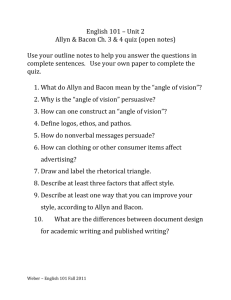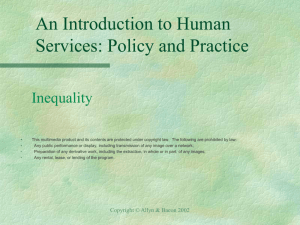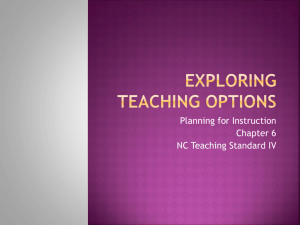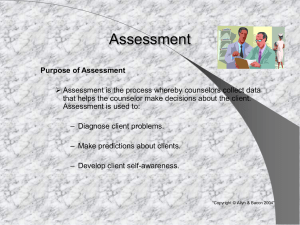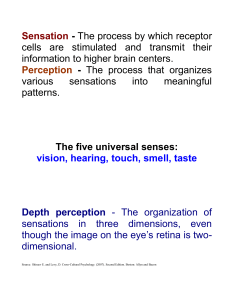Chapter 17 - Humanistic Psychologies
advertisement
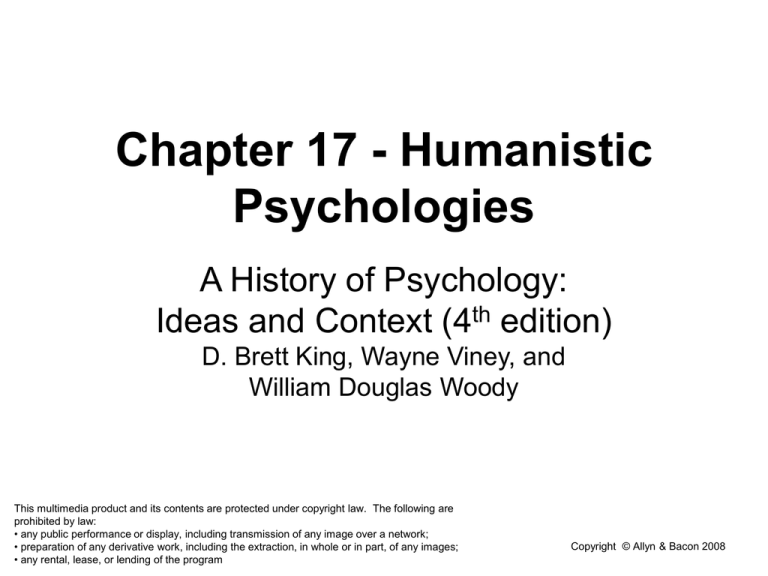
Chapter 17 - Humanistic Psychologies A History of Psychology: Ideas and Context (4th edition) D. Brett King, Wayne Viney, and William Douglas Woody This multimedia product and its contents are protected under copyright law. The following are prohibited by law: • any public performance or display, including transmission of any image over a network; • preparation of any derivative work, including the extraction, in whole or in part, of any images; • any rental, lease, or lending of the program Copyright © Allyn & Bacon 2008 Humanistic Psychologies • Humanistic psychologies are a third force. – An alternative to behaviorism and psychoanalysis • Nicolas of Cusa argued for the theological doctrine of learned ignorance – the “discipline of knowing how not to talk of God.” – Humanistic psychologists find wisdom in negative psychology,. • the discipline of knowing how not to talk about humans. • Humanistic psychologists criticized behaviorism and psychoanalysis. – Humanistic psychologists argued that humans can be aware at a metalevel and transcend their conditioning. – The humanists also maintained that people are more than unconscious motivations. Copyright © Allyn & Bacon 2008 Intellectual Traditions • William James emphasized the foundational nature of experience. – He advocated a pluralistic approach to methods and content. • Existentialism is a philosophical orientation marked by concerns with daily issues in how humans live. – Miguel de Unamuno lamented the failure of science and philosophy to adequately address the problems of human life. – Søren Aabye Kierkegaard rejected rationalism and investigated human experience. • He examined three modes of existence including the following. – The aesthetic mode of existence, which may breed indifference – The ethical mode of existence, which may collapse into emptiness – The religious mode of existence, which may collapse into terror Copyright © Allyn & Bacon 2008 Intellectual Traditions • Existentialism – Martin Heidegger investigated ontological questions, particularly the meaning of individual existence. • He described the human sense finding ourselves in a world we did not choose as Dasein, literally “being there.” • He argues that three characteristics of the human condition are factuality, existentiality, and fallennessess. • Umwelt (the environment) and Mitwelt (the community) may make authenticity more difficult. • Heidegger’s method of understanding being-in-the-world was Daseinsanalysis. Copyright © Allyn & Bacon 2008 Intellectual Traditions • Phenomenology is a method seeking to discover what is given in experience. – Edmund Husserl argued that whatever is given is given in consciousness. – Husserl’s phenomenology opposed any psychology that restricted the range of the field. – He demonstrated that the phenomena of consciousness may not be like anything else. – He opposed reductionism. – He encouraged research on new ways of exploring consciousness. • Franz Brentano directly influenced Husserl. – Brentano also embraced • a pluralistic methodology, • applied psychology, and • the study of the activities of human consciousness. Copyright © Allyn & Bacon 2008 Maslow • The formal emergence of humanistic psychologies occurred slowly. – Abraham Maslow set forth a holistic, dynamic, and purposive system of psychology. – He attempted to maintain scientific integrity. • Maslow focused on motivation. • He arranged motives into a hierarchy that culminates in self-actualization. • Self-actualization is the self-fulfillment that comes about by realizing or accomplishing the potentials with which we were endowed. Copyright © Allyn & Bacon 2008 Maslow • Maslow applied being and deficiency to a variety of psychological functions. • Maslow studied self-actualized people, including Max Wertheimer, Ruth Benedict, and others. • Maslow developed descriptions of common characteristics of self-actualized persons. – These included the occurrence of peak experiences in their lives and – a possible negative tendency toward surgical coldness. • Maslow investigated metalevel awareness in humans, particularly healthy and successful humans. Copyright © Allyn & Bacon 2008 Allport • Gordon Allport investigated the psychology of personality. – Allport distinguished between the Leibnizian tradition and the Lockean tradition. • The Leibnizian tradition emphasizes the purposive nature of human life • The Lockean tradition highlights the mechanistic dimensions of life. – Allport also distinguished between idiographic and nomothetic approaches to psychology. • Allport studied functional autonomy. – Functional autonomy is the idea that an activity has become independent of its original motivational source and is now motivating in its own right. • Allport also investigated the psychology of religion in his classic book The Individual and his Religion. Copyright © Allyn & Bacon 2008 Rogers • Carl R. Rogers founded person-centered therapy. – He worked to challenge the established methods of therapy. – He applied research techniques to the evaluation of therapy. • Rogers’s psychology focused on the phenomenal field, the entire range of experiences that are part of a person’s life. – He explored the tension between the self and the ideal self. • Roger’s explored the distinctions between conditional acceptance and unconditional positive regard. – He advocated unconditional positive regard. • Rogers emphasizes the positive aspects of human nature. Copyright © Allyn & Bacon 2008 Frankl • Viktor Frankl’s system is logotherapy. – His classic work, Man’s Search for Meaning, outlines the importance of meaning in human life, – particularly in the context of his experiences in concentration camps. • Noogenic neuroses result from existential distress and the inability to find meaning in life. • Paradoxical intention is the ability to do the opposite of what we most want to do. • Frankl opposed the narrowness of other forms of psychology. Copyright © Allyn & Bacon 2008 Rychlak • Joseph F. Rychlak advocates a rigorous approach to humanistic psychology. – He emphasizes the role of final cause in human life. – He argues for the capacity for oppositional thinking, teleology (telesponsivity), and free will. Copyright © Allyn & Bacon 2008 Overview Generally, humanistic psychologies • oppose reductionism, • emphasize experience, • embrace contextualism, • advocate for free will, • suggest that basic human nature is good, and • place importance on the relevance of psychological concepts, therapies, and research. Copyright © Allyn & Bacon 2008 Criticisms Criticisms of the system include • difficulties in definition, • a negative attitude toward science, • a negative attitude toward basic research, • the rejection of reductionism, and • an acceptance of the scientifically unverifiable notion of free will. Copyright © Allyn & Bacon 2008
